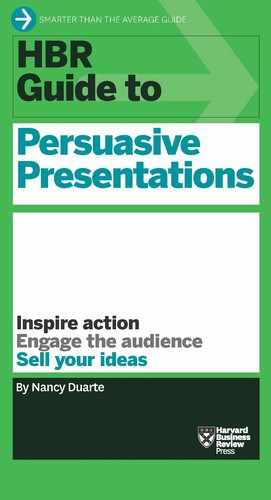Understand the Audience’s Power
When you walk into a room as a presenter, it’s easy to feel as if you’re in a position of power: You’re up front, perhaps even elevated on a stage, and people came to hear you speak. In reality, though, you’re not the star of the show. The audience is.
Why? The people you’re addressing will determine whether your idea spreads or dies, simply by embracing or rejecting it. You need them more than they need you. Since they have that control, it’s crucial to be humble in your approach. Use their desires and goals as a filter for everything you present.
Presenters tend to be self-focused. They have a lot to say, they want to say it well, and they have little time to prepare. These pressures make them forget what’s important to the audience. A self-focused presenter might just describe a new initiative and explain what needs to get done—outlining how to do it, when to do it, and the budget required. Then maybe, if the audience is lucky, he’ll have a slide at the very end about “why it matters.” This format screams, “I pay you to do this, so just do it!” The presenter is so consumed by the mission that he forgets to say why people would want or need to be involved.
Spend a moment in your audience’s shoes. Walk people through why the initiative matters to them and to the organization, what internal and external factors are driving it, and why their support will make it successful. Yes, get through the nitty-gritty details, but set up the valuable role they’ll play in the scenario rather than dictate a laundry list of to-do’s.
Though presentations and audiences vary, one important fact remains constant: The people in your audience came to see what you can do for them, not what they must do for you. So look at the audience as the “hero” of your idea—and yourself as the mentor who helps people see themselves in that role so they’ll want to get behind your idea and propel it forward.
Think of Yoda—a classic example of a wise, humble mentor. In the Star Wars movies, he gives the hero, Luke Skywalker, a special gift (a deeper understanding of the “Force”), trains him to use a magical tool (the lightsaber), and helps him in his fight against the Empire.
Like Yoda and other mentors in mythology, presenters should:
- Give the hero a special gift: Give people insights that will improve their lives. Perhaps you introduce senior managers at your company to an exciting new way to compete in the marketplace. Or maybe you show a roomful of potential clients that you can save them money and time.
- Teach the hero to use a “magical” tool: This is where the people in your audience pick up a new skill or mind-set from you—something that enables them to reach their objectives and yours.
- Help the hero get “unstuck”: Ideally, you’ll come with an idea or a solution that gets the audience out of a difficult or painful situation.
So if you’re gearing up to launch a new service offering, for example, give your team a clear roadmap (tool) and a promise to bring in consultants for training and support (gift)—and describe how these will help everyone rise to the challenge ahead.
